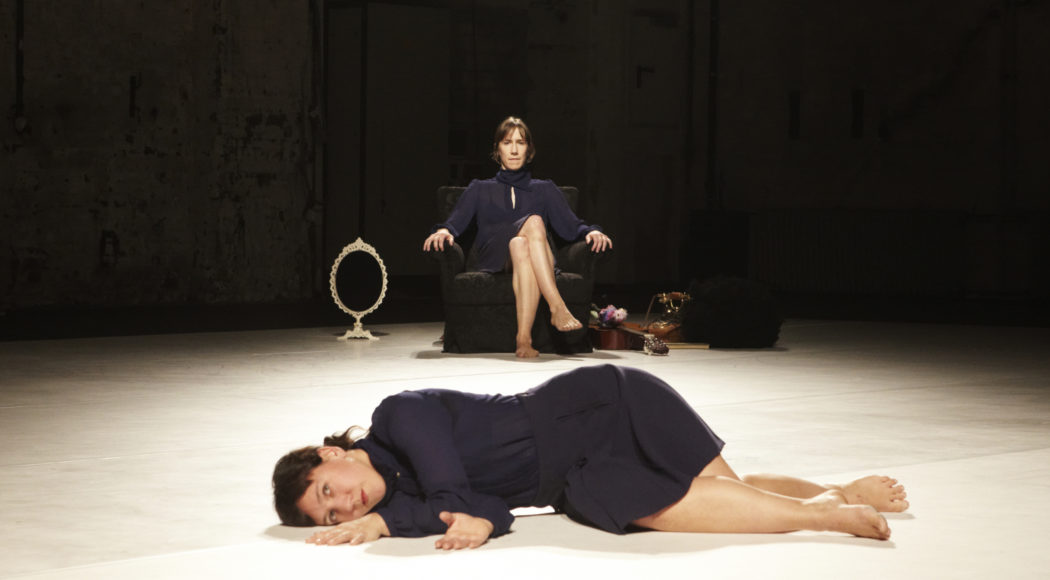The audience keeps us alive, #2 – 2019
“Antje Pfundtner in Gesellschaft” (APiG) under the artistic direction of Hamburg choreographer Antje Pfundtner was last seen at HELLERAU in February 2020 with “Alles auf Anfang”. In addition to their stage works, APiG develops formats of artistic sharing. Since 2018, the three-year dialogue platform “Tischgesellschaften” has served as a regular exchange with other artists and is made possible by the funding TANZPAKT Stadt-Land-Bund. In January 2021, the “Tischgesellschaft” “Back again!” will take place at HELLERAU on the topic of revival and sustainable work as a public format. André Schallenberg, Programme Director Theatre/Dance at HELLERAU spoke with Antje Pfundtner (AP) and Anne Kersting (AK).
How did the idea for the “Tischgesellschaften” come about?
AK: We have initiated similar formats before, for example the “Memory Exchange”, but they were always linked to certain stage projects in order to make them financially possible at all. We were moved by the questions of how we can research beyond concrete productions: To what extent are artists not only producers and how can we ourselves become actors in all the other areas?
AP: For me personally, the “table societies” arise from a question that I have been asking myself for 20 years, since the beginning of my artistic work: What do artists do who have reached the “structural end of their career”, who are structurally limited by the exhaustion of all funding possibilities? Do they stagnate, fall behind, transform themselves into another field? These questions seemed less threatening to me if they were shared. With this, I also wanted to set an impulse to become active as an artist myself, to formulate themes differently, to share funds differently and thus to approach institutions and our audiences at eye level. We hope that this will lead to a sustainable self-empowerment of the scene – through the development of concrete approaches for a cross-project financing of dance art, but also through the bundling of energies and resources. We trust that in the end something will be found that does not lead to a definition or a framework of thought, but to an openness that stimulates.
How do you choose the topics for the “table companies”?
AP: We have two basic questions: how do you share ideas and how do you share money? Sharing ideas is often linked to questions of copyright, authorship – very sensitive points, not only in the arts. And sharing money is of course sensitive per se. I think it’s very good and important that these are such sensitive issues. In the context of this, we have gathered three other topics: the question of re-da, i.e. re-performance, with which we will also come to Dresden. Why is art often not “sustainable” in its production, since many works disappear again after their first performances? The second question concerns money and its distribution. That is also a question of power. We are currently setting up our own fund as an experiment, into which artists pay. It is meant as an instrument to be able to play through the financing of art and its mechanisms. The third question concerns the audience: Audiences keep us alive. How do we work with them and for them? What partnerships do we enter into with them?
Do you also see this as a political work?
AK: Godard put it perfectly: he doesn’t make films about politics, but political films. So it’s about working and doing – communicating a practice.
AP: We have a need for broad communication and negotiation. The confrontation, the utterance in itself is also a political act. I have never understood why people say that dance is apolitical. It is first and foremost a form of expression that makes itself public and to which you have to relate. There are also colleagues who separate their artistic work from their political work. I find that very interesting because that has always been one thing for me.
The “table societies” follow a larger idea of artistic work. How would you describe it?
AK: It’s about making yourself and your artistic practice available as a medium. The “table societies” make this dialogue possible. They offer a discursive space for action as a public platform. Unlike the default: you get money, so you perform something publicly. But that has nothing to do with publication per se, but with exploitation.
AP: I’ve been asked before, “What do you actually do during the day?” It is unimaginable for many people what kind of work lies behind artistic activity, what research and searching movements. Everything that comes before and after a play is also our work, the stage production is only one part of it. And in the best case, it’s just “dealing” with social issues. Contemporary dance has opened up extremely widely in recent decades, both aesthetically and formally. In doing so, it has also managed to strongly influence many other art forms and society. We are moving in this environment. For me, contemporary dance is the most exciting art form.
Tip! 22. – 24.01. Tischgesellschaft: “Back again!” Talk and film documentary “Vertanzt” | Antje Pfundtner in Gesellschaft (DE)
Antje Pfundtner works as a choreographer in Hamburg. In 2016, she received the George Tabori Main Prize endowed with €20,000. In 2020, she was honoured with the German Dance Award 2020 for her outstanding artistic development in dance. Anne Kersting is a dramaturge and curator and has been working with Antje Pfundtner since 2007. Supported by TANZPAKT Stadt-Land-Bund with funds from the Federal Government Commissioner for Culture and the Media and by the Free and Hanseatic City of Hamburg, Department for Culture and the Media.


